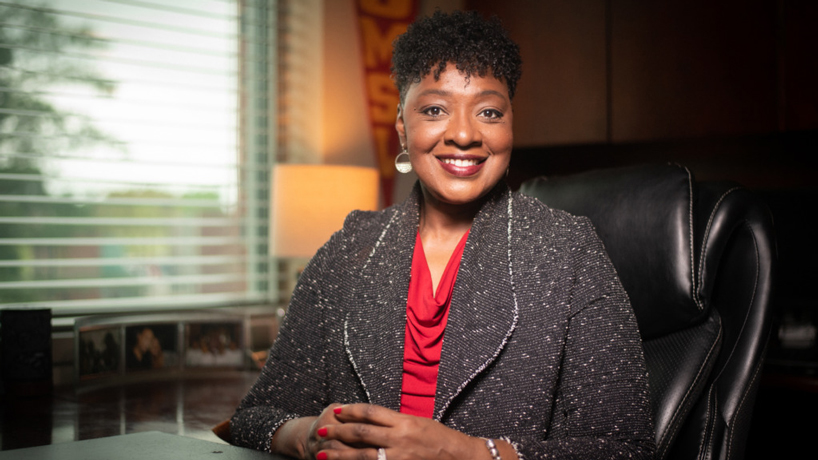
Natissia Small is taking on an expanded role as vice provost for access, academic support and workforce integration. (Photo by Michael Thomas/STL Made)
Natissia Small understands the barriers that exist for people living in underserved communities that can stand in the way of educational and career advancement.
She feels fortunate that as she grew up in Charleston, Missouri, her mother and father instilled in her a love of learning and supported and encouraged her as she went to college and earned her degree.
“As a first-generation college student from a rural area that grew up from a background in which you’re not considered middle class or upper class, the odds were stacked against me to achieve educational success,” Small said. “I am driven to determine what accessible pathways are available for students and families who are motivated to seek higher education yet faced with barriers that can be overwhelming.”
It has been a central part of Small’s work throughout her more than 25 years working in educational access and support at the University of Missouri–St. Louis.
Now Small is being charged with helping build even more pathways to education and job training in an expanded role as vice provost for access, academic support and workforce integration. Small assumed the new position on June 1.
“UMSL embraces Greater St. Louis Inc.’s STL 2030 Jobs Plan, which calls for a coordinated effort between industry and education and training providers to establish clear, well-supported and inclusive pathways into quality jobs that pay a livable wage,” Chancellor Kristin Sobolik said. “Our university has a critical role in supporting this plan, and we think Dr. Natissia Small is the perfect person to direct that work alongside our partners.
“Natissia has overseen UMSL’s precollegiate programming and student academic support services and has a long record of success expanding college access for students from underserved communities and helping provide the support they need to be successful and earn their degrees. We see her building on those accomplishments in this expanded role.”
Small aims to engage people who might not otherwise have envisioned opportunities for themselves earning a four-year degree on a college campus by showing them the value they can get from a certificate program that provides knowledge and credentials to get ahead in an in-demand field.
Among the students who stand to benefit are high school students who may only have a GED or who need support obtaining a GED, transfer students interested in a certificate program or adult students seeking to advance their career or transition to another career altogether.
“I believe that we’re going to be able to continue to increase the scale of the programs that we offer,” Small said. “UMSL is doing extremely well in assessing and developing educational programs that align with meeting the talent needs our corporate partners are seeking, much of which is outlined in the STL 2030 Jobs Plan, while also meeting the changing workforce needs throughout the region.”
St. Louis is expected to see job growth in areas such as technology and health care, and training from UMSL can help prepare people to meet the needs of employers.
“We are positioned to have a direct impact on increasing skilled talent in the region,” Small said. “Our workforce integration initiatives will diversify the educational options to enter the workforce.
“Frankly, one of the benefits that I consider to be the most gratifying is knowing that we have an opportunity to truly change the trajectory of someone’s life who may not have been able to enter into a traditional four-year institution in the manner as others, but now we’re creating another accessible pathway to opportunities while promoting lifelong success by further removing barriers.”
That’s right in line with UMSL’s work to increase social mobility and build inclusive prosperity.
Small also sees certificate programs as another potential path for students to ultimately pursue a four-year degree. By providing experiences in a college environment, she thinks it could empower individuals, shift mindsets and lead more to pursue higher education.
“Natissia believes strongly in the transformative power of higher education, and she has worked tirelessly to remove obstacles that have prevented some students from taking advantage of those benefits,” Provost and Executive Vice Chancellor for Academic Affairs Marie T. Mora said. “By expanding her role to focus on workforce integration as part of her efforts to increase access, she will be ideally positioned to impact even more members of our community.”
Small started her career at UMSL working in the Office of Student Financial Aid and later became a counselor for the Bridge Program and then its director. She has served as the assistant dean of students and more recently has been leading the UMSL’s Student Academic Support Services unit, where she has oversight of Student Enrichment and Achievement, Multicultural Student Services, the University Tutoring Center, Precollegiate Student Services and TRIO Student Support Services.
She received a bachelor’s degree in mass communication from Southeast Missouri State University and dual master degrees in secondary education-adult education and counseling from UMSL. She also earned a doctorate in Educational Policy and Leadership from UMSL.
She has received multiple awards and recognitions throughout her career, including the UMSL Trailblazer Award, the North County Churches Uniting for Racial Harmony and Justice Youth Task Force Mentor of the Year Award, North County Inc.’s “Thirty Leaders in their 30s,” the City of Florissant Making a Difference Award, The St. Louis American’s Salute to Excellence in Education Award and the North County Inc. Community Development Leadership Award.














